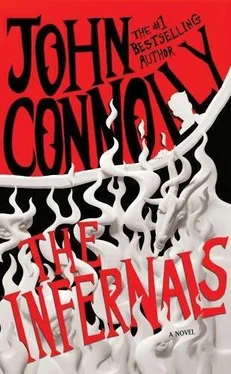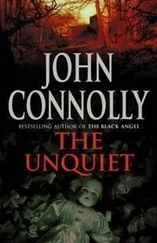• • •
Samuel and Boswell moved on. They saw a great wooden horse burning; around it sat Greek warriors, lost in melancholy. Warily, Samuel approached them, but the warriors did not stir, and when he tried to speak to them they did not answer.
“What do you want, child?” said a voice, and Samuel turned to see a woman emerge from the sand: first the head, then the body, until she stood before him, grains tumbling from her hair, her hands, her gown. As Samuel looked more closely at her he saw that she had not merely risen from the sand: she was sand, different textures and hues combining to give the impression of clothing, and color, and life. Only her eyes were not formed from sand: they blazed a deep, fiery red, and Samuel knew that he was staring at a demon.
“This is… the Trojan horse, isn’t it?” said Samuel.
“It is.”
“And these are the men who used it to gain access to the city.”
“They are. The one who sits apart from the others, the man alone, that is Odysseus.” She spoke his name softly. “The horse was his idea.”
“But why are they here?”
“Because it was an act of deception. It was not honest, not truthful.”
“But it was clever.”
“A lie may be clever, but it is still a lie.”
“But don’t they say that all is fair in love and war? I heard that somewhere.”
“‘They’?” Who are ‘they’?”
“I don’t know. Just people.”
“That’s what the victorious claim, not the defeated; the powerful, not the powerless. ‘All is fair.’ ‘The end justifies the means.’ Is that what you believe?”
“I don’t know.”
“Is there someone that you love? A girl, perhaps?”
“There’s a girl that I like.”
“Would you lie to gain her affection?”
“No, I don’t think so.”
“You don’t think so?”
“No, I wouldn’t.”
“And if someone lied to her about you in order to turn her against you, would you feel that was fair?”
“No, of course not.”
“Have you heard it said that sport is war by other means?”
“I haven’t, but I suppose it could be true.”
“Do you cheat when you play games?”
“No.”
“Why?”
“Because it’s not right. It’s not…”
“Fair?”
“No, it’s not fair.”
“So all is not fair in love, and all is not fair in war.”
“I suppose not.” Samuel was troubled. He looked at the warriors, but none of them seemed to have paid any attention to his conversation with the demon. “It still seems like a harsh punishment,” he said.
“It is,” said the demon, with something like regret in her voice.
“Who decided?” asked Samuel. “Who decided that they should be here?”
“They decided,” said the demon. “They chose. Now go, child. Their melancholy is infectious.”
The grains of sand at her eyes formed a tear that shed itself upon her cheek. The demon sank back into the ground, and Samuel and Boswell turned away from the burning horse and continued their journey.
In Which We Meet the Blacksmith
THE BARREN LANDSCAPE BEGAN to change, although not for the better. It was now dotted with objects that seemed to come from another world, Samuel’s world: a suit of armor, empty and rusted; a German biplane from World War I; a submarine standing perfectly upright, balanced on its propellers; and a rifle, the largest, longest gun that Samuel had ever seen, so long that it would have taken him an hour or more just to walk around it, made up of millions and millions of smaller guns, all fused together to create a kind of giant sculpture. As Samuel examined it he saw that pieces of the rifle appeared to be alive, wriggling like metal snakes, and he realized that the rifle was still forming, weapons popping into existence in the air around it and slowly being absorbed into the whole.
A huge man appeared from behind the discarded turret of a tank. He wore dirty black overalls and a welder’s mask upon his face. In his right hand he held a blowtorch that burned with a white-hot flame. He killed the flame and pushed the mask up so that his face was revealed. He was bearded, and his eyes shone with the same white fire as his torch, as though he had spent too long looking at metal dissolve.
“Who are you?” he asked. His voice was hoarse, but there was no hostility to his tone.
“My name is Samuel Johnson, and this is Boswell.”
Those white eyes looked down upon the little dachshund.
“A dog,” said the man. “It’s a long time since I’ve seen a dog.”
He reached out a gloved hand. Boswell shied away, but the hand was too quick. It fastened on Boswell’s head, then rubbed at it with a surprising gentleness.
“Good dog,” said the man. “Good little dog.”
He released his grip on Boswell, somewhat to the relief of the good little dog in question.
“I kept dogs,” he said. “A man should have a dog.”
“Do you have a name?” asked Samuel.
“I had a name once as well, but I’ve forgotten it. I have no use for it, for nobody has come here for so very long. Now I am the Blacksmith. I work with metal. It is my punishment.”
“What is this place?” asked Samuel.
“This is the Junkyard. It is the place of broken things that should never have been made. Come and see.”
And Samuel and Boswell followed the Blacksmith beneath the ever-changing gun, and past row upon row of fighter planes and armored cars, and there was revealed to them an enormous crater, and in it were swords and knives; machine guns and pistols; tanks and battleships and aircraft carriers; every conceivable weapon that might be used to inflict harm upon another person. Like the great gun, the contents of the crater were constantly being added to, so that the whole mass of metal creaked and groaned and clattered and clanked.
“Why are they here?” asked Samuel.
“Because they took lives, and this is where they belong.”
“Then why are you here?”
“Because I designed such weapons, and I put them in the hands of those who would use them against innocents, and I did not care. Now I break them down.”
“What about the great gun, the one that keeps growing in size?”
“A reminder to me,” said the Blacksmith. “No matter how hard I work, or how many weapons I break down, still that rifle increases in size. I contributed to the creation of firearms in life, and I am not permitted to forget it.”
“I’m sorry,” said Samuel. “You don’t seem like a bad person.”
“I didn’t think that I was,” said the Blacksmith. “Or perhaps I just didn’t think. And you: why are you here?”
Samuel was still wary of telling the truth about his situation, particularly after his encounter with Old Ram, but something about the Blacksmith made Samuel trust him.
“I was dragged here. A woman-a demon-called Mrs. Abernathy wants to punish me.”
The Blacksmith grinned. “So you are the boy. Even I, in this dreadful place, have heard tell of you.” He fumbled beneath his apron, and brought out a piece of newspaper, which he handed to Samuel. It was a cutting from an old edition of The Infernal Times, and it showed a picture of Samuel beneath two words:
THE ENEMY!
The article that followed, written by the editor, Mr. P. Bodkin, detailed the attempt to escape from Hell through the portal, and the failure of the invasion because of the intervention of Samuel and an unknown other who had driven a car the wrong way through the portal. Samuel thought that the article was a little unfair, and only told one side of the story, but then he supposed that the editor of The Infernal Times might have found himself in a spot of trouble had he suggested that sending hordes of demons to invade the Earth wasn’t a very nice thing to do in the first place.
Читать дальше












